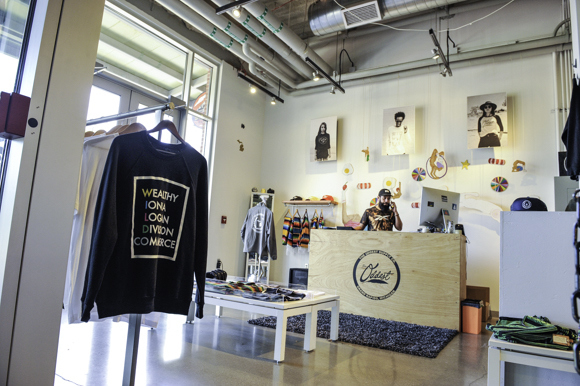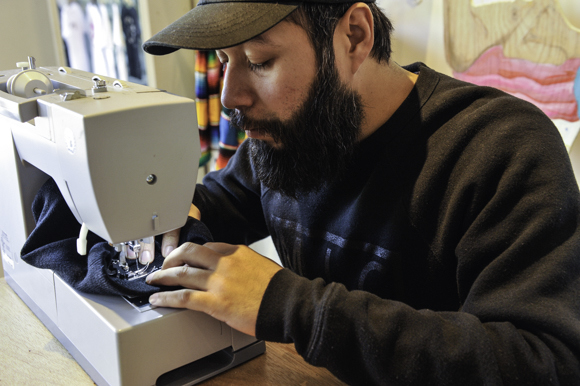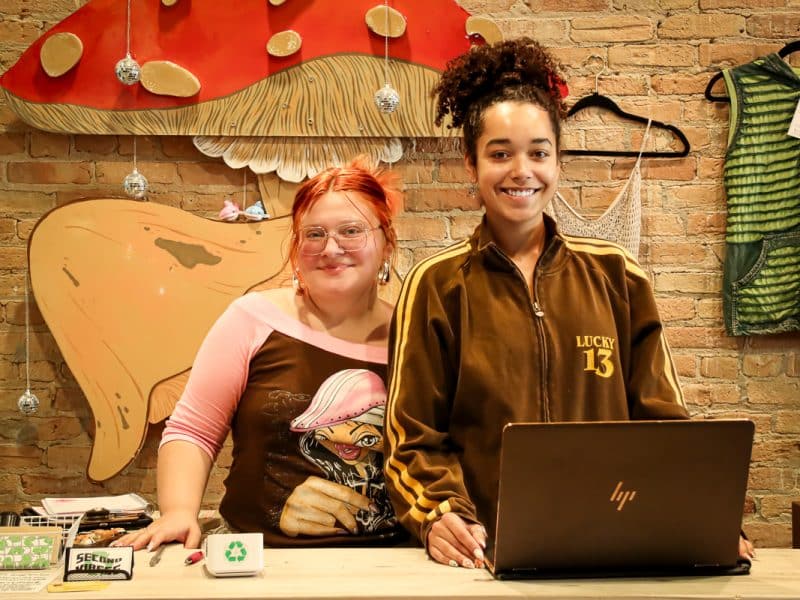Lazy is the new smart: How millennial entrepreneurs are shaping a generation
Millennials are the nation's largest living generation, and despite their bad rap, the 'millipreneurs' of Grand Rapids are shattering the ever-popular stereotype of the lazy and entitled millennial.

“That’s such a millennial statement,” laughs his 29-year-old wife, Laura, a fellow entrepreneur and founder of Blackbird RSVP.
Today, many hear the term “millennial” and cringe, picturing a generation of kids who all got trophies, no matter where they placed, and don’t want to put in any real work but still expect big results — and all at the push of a button. They are often called lazy, entitled and spoiled.
But, in February, Fortune Magazine published the results of the 2016 BNP Paribas Global Entrepreneur Report that showed millennials — roughly defined as those between the ages of 20 and 35 — have launched about twice as many businesses as their boomer parents. So, how is a generation that supposedly doesn’t want to do anything but play video games slowly taking over the world of entrepreneurship (arguably one of the most time-consuming and difficult career journeys out there)? And why would such a “lazy” generation even want to go into business for themselves?
The answers to these questions, and the crushing of the millennial stereotype, is visible when you take a look at the millennials living and working within the entrepreneurship ecosystem in Grand Rapids.

Ryan and Laura Vaughn might be the epitome of the millennial couple — that is, the millennials as they actually exist. As I chat with them from their home in the Creston neighborhood, they hang out with their baby and check in on work with their phones. They are certainly not the lazy, entitled millennials people seem to insist on calling out when describing the generation that is now filling the workforce.
From as early as elementary school (Ryan Vaughn started out by selling Pogs to his fellow students), into college and beyond, the millennials of Grand Rapids are using entrepreneurship to break the traditions of past generations and forge a path that meets their needs, passions and dreams. And, in a state that is also working to find a new path and forge a new economy in the aftermath of the “Great Recession” and the meltdown of the auto industry, these “lazy” millennials are birthing and building the ideas, plus creating the apps and products, that will do just that.
A new path
When Ryan and Laura Vaughn graduated from college, in 2006 and 2008 from Western Michigan University, ready to get jobs just as their parents had, the recession hit. Ryan Vaughn waited tables and Laura Vaughn went into sales, where she felt she would always be employable.
“There’s this path,” says Ryan Vaughn, “that is supposed to produce results, and it just doesn’t. So, you come up with your own path.” They, along with the rest of their generation, were forced to rethink the futures that were supposed to be secure.
“And if nothing is secure anyway, I’d rather do something I like,” says Ryan Vaughn. “So, I created my ideal version of work.” That ideal version of work has become one of the largest and fastest growing high school sports and marketing communications platforms in the country, Varsity News Network — which is based right here in Grand Rapids.
For Laura Vaughn, who discovered the entrepreneurship community by accident while researching coworking spaces, it was all about finding needs and filling them. “I liked the idea of seeing a problem and doing something about it,” she explains. What she saw was a void in the quickly growing, millennial-driven industry of wedding websites. She filled that void with her first business and then expanded to other events with Blackbird RSVP, an easy way to create and manage events online.
For Edgar Hernandez, 33, founder of The Oddest Supply Co, a Grand Rapids-based design and apparel company, the path that generations before him followed never seemed like the right choice. “I always knew I wouldn’t be 100 percent happy working for somebody else,” he says. “It always ends up limiting you in some way, or delaying how fast you can get to where you want to be. I don’t want someone to have control over my life or career.”
The paths in front of them weren’t only affected by a lack of jobs, but also by a mountain of student debt and few ways to pay it back. “For this generation, the student loan debt will be a part of their life,” says Matt Larson, the entrepreneur in residence at Grand Valley State University and the co-founder of CampusStarter, a crowdfunding platform for college entrepreneurs. And, Larson notes, since the traditional jobs many were counting on after graduation weren’t available, “exploring ideas they have now, even on the side, is a good way to combat that.”

As the recession reared its ugly head, and past paths weren’t what they once were, views of the working world began to change for millennials. “My first big boy job was in the automotive industry,” says Ryan Vaughn. “Then everything got messed up.” He had already started dabbling in entrepreneurship with his first business, West Michigan Allstar when a job at GVSU as the entrepreneur in residence really immersed him the community of entrepreneurship, and he was hooked. “I met really smart, driven people with their own businesses, who were actually accessible,” he says.

Leandra Williams, 32, founder of Stingray Advisory Group — a Grand Rapids-based business that provides startup assistance, marketing solutions, website design, and more — took a job right after college. However, after leaving to start her consulting company, she knew she would never go back to traditional work.
“In the past,” she says, “you had loyalty to your employer.” But now millennials, who are often criticized for having no loyalty to the businesses they work for, “are starting to see that the companies you start will go further with your hard work and energy, and I don’t see those things as wrong to want.”
Jordan Vanderham, 21, a student at the Grand Valley State University School of Engineering and founder of the Grand Rapids-based Orindi Ventures, which develops and produces outerwear accessories for, as the company describes them, “the extreme adventurer,” has multiple paths in mind and doesn’t look at job hopping as disloyal. He plans to get a job after school and focus on his business — and can see himself changing jobs if needed. “I will only work at a job if I am learning or growing, and if I’m not, I am not adding value to myself or the company,” he says.
Lazy is the new smart
So, what makes an entire generation seem lazy even as they are building businesses?
“I don’t think they are lazy,” says Ryan Vaughn. “Society has just changed. Hard work looks different to millennials.”
And, the way they work looks different to millennials.
Staying home on a Friday to be with your baby may look “lazy” to some, but those critics should think again. “Even though I’m home,” says Laura, “I’m still online doing customer support. We (millennials) are never ‘off.'”
The constant connection offered by technology has shifted the way we can work and therefore shifted the perceptions of work. Millennials are simply taking advantage of the resources offered to them, and some are actually inventing those resources.
When millennials have a problem, they now have a million ways to solve them. They have the answers at the tips of their fingers, and if they can’t find the answer as quickly as they would like, they create it.
Vanderham, who was often outside breathing cold air, frequently found himself with a red, cold nose and was bothered by it. His solution? A low-profile mask that warms and humidifies air before it hits your lungs. His solution to one small problem ended up helping anyone from kids with asthmatic coughs to industrial workers working in frigid temperatures. “Instead of getting a scarf, I made a company,” he says.
While the age of instant gratification has given an entire generation the need for an answer in an instant, it’s also given them the drive to create the answers they can’t find fast enough.
So, says Ryan Vaughn, “We’re not lazy. We just create industries.”
And these industries are making an impact for the next generation. “They are creating all these SAAS (software as a service) products that are making it easier to start businesses,” says Laura Vaughn. “They made products that made it easier for them to start companies, and now it’s making it easier for others.”
This same technology that helps them create businesses also gives them the ability to grow their companies and fuel their creativity like never before.
Through travel and connection Hernandez saw what his city was missing compared to the rest of the world. “I always had a thing for fashion and style, and you would always see apparel that represented the lifestyle of Cali, Paris, Tokyo, or London,” he says. “… At home you just didn’t see that. I realized there was an opportunity to do that in Michigan.”
That connection and inspiration isn’t just an asset for entrepreneurs, and while hanging out on your phone may look lazy, it often serves a greater purpose. “We are getting information so fast and that can spark an idea and you can use it in your business or take it back to your company,” says Hernandez.
Williams, who has expanded her Grand Rapids business to the lakeshore, Southwest Michigan and more to come, says hearing her generation called lazy “makes me cringe, to be honest. I know there are others like myself who are passionate and driven and determined to better the communities they live in.”
A new end game
While many millennials are simply going where jobs, or the lack thereof, leads them, this change of path has also brought a different end game. While past generations took jobs in order to support their families and provide a stable future, the family situation has even changed for many millennials.
“At this point in past generations they already had families,” says Hernandez, “and many of us are still unmarried with no kids, so we don’t have to work as hard to support ourselves.”
This translates to them being able to focus on other dreams and goals.
“I want to carry on through life in a way that doesn’t feel like I’m working,” says Hernandez. “It is work, but it’s also a lot of fun. I want to bring fresh new concepts to the world.”
Bringing new ideas, and bettering themselves and their communities seems to be the focus for many millennials as they look to the future.
“I love being able to develop processes and procedures, determine who to serve and use my passion to serve a market,” says Williams. “I love seeing the impact I can have on an organization.”
The need to be fulfilled is what is driving many millennials. “That’s the draw of entrepreneurship,” says Laura Vaughn. “I’m not getting rich, but I’m doing something interesting and fulfilling. And, at times, it’s really stressful, but at least it’s something I’m in control of.”
“Making It In Grand Rapids” is a series about local entrepreneurs and the issues that matter in building a sustainable startup-friendly community. Support for this series is provided by Start Garden. You can reach the author of this story on Twitter or e-mail her at alspooner@gmail.com for story tips and feedback.
Photography by Steph Harding.








